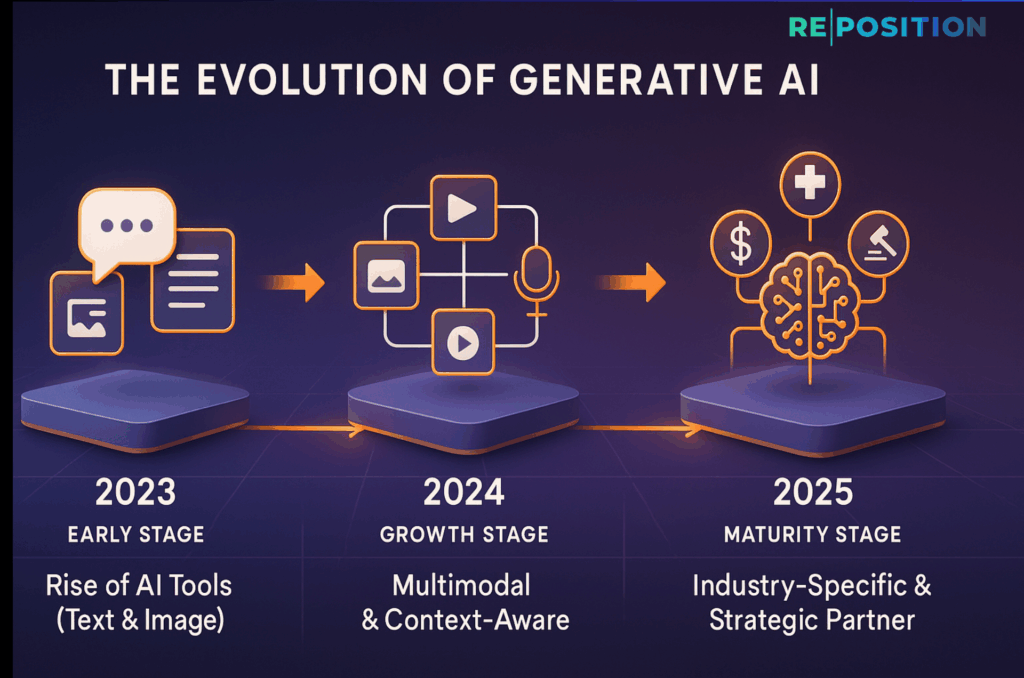Generative AI is no longer just a tech buzzword. By 2025, it has become an everyday force driving business innovation, shaping creativity, and powering personalized digital experiences. Unlike traditional AI, which analyzes data, this new wave of artificial intelligence creates: from tailored marketing campaigns to architectural designs, personalized healthcare plans, and even entire business models.
This shift is not only changing how companies operate but also how individuals interact with the world around them.

Generative AI first gained attention in 2023 with the rise of tools like ChatGPT and MidJourney. Fast forward to 2025, and the technology has matured. Models are now:
AI-driven innovation has evolved from a creative assistant into a strategic partner for decision-making and problem-solving.
Artists, writers, and designers are discovering that Generative technology is not competition but collaboration. It helps by:
Rather than replacing creativity, this machine creativity is expanding the canvas, allowing professionals to ideate faster and execute bigger visions.
Executives are turning to advanced AI models to simulate outcomes, test strategies, and anticipate risks. In 2025, companies rely on AI to:
In Dubai, smart businesses are integrating advanced AI models into fintech platforms, real estate planning, and government services, making data-driven decision-making faster and more precise.
Healthcare has been revolutionized by advanced AI systems in 2025. Instead of generic treatments, patients now benefit from personalized healthcare plans generated by AI models. Doctors use it to:
The result? More precise medicine and greater patient trust.
Learning is no longer one-size-fits-all. AI-driven tutors adapt lessons to each student’s pace, style, and interests. In Dubai, AI-driven platforms are part of the city’s Smart Education initiatives, ensuring students learn in multilingual, culturally relevant formats.
This personalization ensures higher engagement and better retention.
Dubai’s skyline has always been futuristic, but in 2025, AI-powered design tools are influencing how buildings and neighborhoods are created. Architects use AI to:
This means urban planning is now smarter, greener, and more people-centered.
Advanced AI systems thrive on personalization. Businesses use it to:
Instead of generic ads, users receive experiences that feel uniquely designed for them.
With great power comes great responsibility. The rise of AI innovation has sparked debates on:
In Dubai and globally, regulators are introducing AI ethics frameworks to balance innovation with accountability.
Is AI replacing jobs? The reality is more nuanced. Intelligent automation is handling repetitive tasks, but it’s also creating new roles in prompt engineering, AI auditing, and AI creativity.
In 2025, the winning strategy is AI-human collaboration, not competition.
AI-driven chatbots are now empathetic, context-aware, and multilingual. In hospitality, banking, and healthcare, customers interact with intelligent assistants that feel more like a trusted partner than a script.
This evolution enhances loyalty and customer satisfaction.
Banks and fintech firms use advanced AI systems to:
Dubai’s financial hub DIFC is leading adoption, showcasing how AI-powered platforms integrate into a global financial ecosystem.
Dubai’s vision of becoming the smartest city in the world is fueled by advanced AI systems. Applications include:
advanced AI systems is not just powering businesses, it’s powering cities.
By 2025, regulations have become central to advanced AI. Countries like the UAE are balancing innovation with governance, ensuring AI tools are safe, fair, and inclusive. Businesses that align with ethical and legal standards earn greater AI visibility.
Looking past 2025, advanced AI systems will evolve towards:
The future is not man vs. machine but man with machine.
In 2025, Generative AI is not just another technological leap, it’s the foundation of a new digital era. From Dubai to global markets, industries are reimagining workflows, user experiences, and creativity with AI at their core.
Those who embrace this transformation today will not only thrive in 2025 but also shape the future of innovation for decades to come.
What is Generative AI?
It is artificial intelligence that creates new content, text, images, video, or solutions, instead of just analyzing data.
How is Generative AI used in Dubai?
Dubai uses advanced AI models for smart city planning, real estate, healthcare, and education as part of its digital transformation.
Will Generative AI replace human creativity?
No. It enhances human creativity by providing new tools, ideas, and faster execution.
Is Generative AI safe?
Yes, when regulated properly. Governments and companies are working to reduce risks like bias and misinformation.
Which industries benefit most from advanced AI systems?
Healthcare, finance, real estate, retail, and education are seeing the biggest transformations in 2025.
How can businesses prepare for Generative AI?
By investing in AI literacy, ethical adoption, and content personalization strategies.